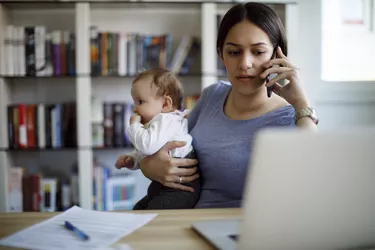
People who lose their jobs through no fault of their own may qualify to get unemployment benefits through the U.S. Department of Labor. To do this, you must apply at your local unemployment insurance office – or via its website – and follow the regulations for determining eligibility. One aspect of these regulations is a phone interview. Although not used in every instance, phone interviews are a regular part of the unemployment benefits determination process.
Purpose of Phone Interview
Video of the Day
The purpose of a phone interview after filing unemployment is always to verify data on your application. Without accurate data, unemployment representatives cannot assess your eligibility accurately. Representatives may schedule phone interviews because there was some kind of mistake on your paperwork that will be rectified on the phone. Phone interviews are also necessary if data from your employer conflicts with what is on your application.
Video of the Day
Once the representatives know that all data is accurate and complete, they can proceed with putting through your application.
Question of Eligibility
Given the purpose of the phone interview, most states do not conduct phone interviews as a required part of the unemployment application process. To require phone interviews for every applicant would be both costly and time-intensive, so unemployment offices typically say that they will schedule phone interviews in the instance a question arises about your application.
In a very clear case where an employer is cooperative and you've filled out the paperwork properly, this may not happen. Often, however, employers protest claims, or applicants don't complete the application correctly, so phone interviews have become common.
Assumption of Interview
Because there really is no way to determine ahead of time whether an unemployment representative will require more information from you, it's a good idea to assume the unemployment office will need to call. Because this interview can sway the representative for or against your claim, it's very important that you are prepared for questions the representative may ask.
It helps if you review a copy of your application ahead of time, as well as any supporting documents you might have included with the application. An attorney can give you advice on how to approach the interview, showing you laws and precedents to make your argument stronger.
Meaning Behind the Interview
Because the purpose of the unemployment phone interview is to verify data to clarify eligibility, getting a notice from your unemployment office does not mean you will be denied benefits. It does, however, mean that your benefits may be slightly delayed, as the unemployment office cannot issue money to you until it proves you are entitled to the funds. In most states, if you are scheduled for a phone interview, it occurs within ten days of filing.
Most people receive their first benefit check within two to three weeks of filing their claim, says the U.S. Department of Labor, despite the prevalence of phone interviews. However, the influx of applications due to COVID-19 has caused delays in many states, and this can mean a wait of a month or more to receive benefits. However, you can expect to receive retroactive pay.